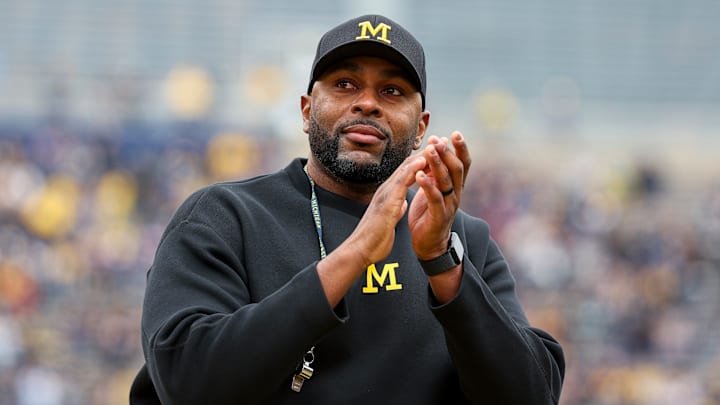The day everyone (well, everyone in Columbus, Ohio, at least) had been waiting for finally arrived on Friday, when the NCAA n̶e̶w̶s̶-̶d̶u̶m̶p̶e̶d̶ announced the punishments it would be levying against Michigan football for last year's Connor Stalions scandal. And while rival fans may have been hoping for a hammer, the Wolverines instead got a relative slap on the wrist.
The NCAA settled on four years of probation, a series of fines, a 14-week ban on recruiting communications and show-cause penalties for Stalions (eight years), Denard Robinson (three years) and Jim Harbaugh (10 years) — none of whom actually work at Michigan anymore. The closest anything came to affecting what happens on an actual football field was a three-game suspension for head coach Sherrone Moore, and even that was just adding one extra game (the season-opener against Western Michigan in 2026) to the two-game ban Michigan had already self-imposed this year.
Official, from the NCAA: Michigan's penalties for the advanced scouting/sign-stealing scandal: pic.twitter.com/UE4nZnf6mZ
— Nicole Auerbach (@NicoleAuerbach) August 15, 2025
We don't need to put on our tin-foil hats, or wring our hands about the integrity of the sport. Nobody was materially harmed by what Michigan did over the last few years, and the evidence that it actually affected the outcome of games is mixed at best. But it's still a notably light punishment, one that doesn't seem to line up with the findings of ... the NCAA itself.
Don't take our word for it; just ask them:
The NCAA: "Harbaugh ran a program that was largely dismissive of rules compliance. There was little, if any, emphasis on following the rules."
— Nicole Auerbach (@NicoleAuerbach) August 15, 2025
College football history is littered with players, coaches and programs who were more substantially punished for being "largely dismissive of rules compliance" than Michigan was. And this wasn't just a Harbaugh thing; according to the NCAA's investigation, the team's current head coach deleted his text messages with Stalions in anticipation of questioning.
Regarding Sherrone Moore's deleted text message thread with Stalions, per NCAA report: "When questioned by the enforcement staff, Moore initially blamed the deleted messages on storage space, although he eventually admitted to deleting them as a reaction to the news."
— Adam Rittenberg (@ESPNRittenberg) August 15, 2025
Members of Michigan's football program were found to have cheated in ways that at least attempted to give the Wolverines an undue competitive advantage. (If not, why else would they have done it?) And the powers-that-be, including the man who now runs the program, were found to be at best indifferent and at worst complicit. Add it all up, and it sure sounds like something the NCAA would've come down hard on in the past. And again, that's not speculation: That's what the NCAA itself just said — the investigation found sufficient grounds for a postseason ban, but opted against imposing one.
The NCAA says there were sufficient grounds for a multiyear postseason ban. "However, the panel determined that a postseason ban would unfairly penalize student-athletes for the actions of coaches and staff who are no longer associated with the Michigan football program."
— Nicole Auerbach (@NicoleAuerbach) August 15, 2025
Again, I don't want to come across as overheated here; there's no need to gnash our teeth or bemoan what's become of our beautiful game, and the Stalions scandal almost certainly didn't impact the outcome of games as much as the Wolverines' rivals want to pretend it did. But it still strikes me as notable that there's such a profound gap between what the NCAA found and the punishment it decided to levy, and that gap should probably concern us moving forward.
NCAA cedes any claim to control over college sports with dissonant Michigan ruling
The NCAA's own ruling more or less throws up its hands. "We can't possibly pretend to understand this new landscape of college football," the subtext reads, "so we're not going to bother trying". Rather than attempt to make sense of the latticework of rules that new govern how programs build their rosters, the NCAA defaulted to the one thing it's always understood: money.
The NCAA says that the Michigan case would have resulted in a postseason ban, but it avoided it in large part because of the changing landscape of college sports: pic.twitter.com/rCLlagpWrI
— Nicole Auerbach (@NicoleAuerbach) August 15, 2025
Far be it from me to go to bat for the NCAA, an institution that has never, at any time, truly had the best interests of college football at heart. Its enforcements have always been arbitrary, capricious and short-sighted, even when it had enough clout to truly rule with an iron fist.
Those days are long gone now, though, and if that weren't already clear enough, it should be after Friday. The NCAA is more or less admitting here that it no longer lays any claim to being in charge, that its control over the sport it purports to govern is nominal at best.
I'm not saying that granting more power to the NCAA, an institution that has abused it at every turn, is a good idea. But I am saying that some central authority needs to exist in order for any of this to work; just look at how much chaos the piecemeal implementation of NIL rules and regulations has sown in recent years for evidence. The NCAA was never really that; its never had the sort of latitude that, say, the commissioner of a sports league would, and its interests were never aligned with those of big-time college football. We need something more robust than what we have now, however, or else programs around the country are going to correctly come to the conclusion that the punishments don't remotely fit the crimes.
